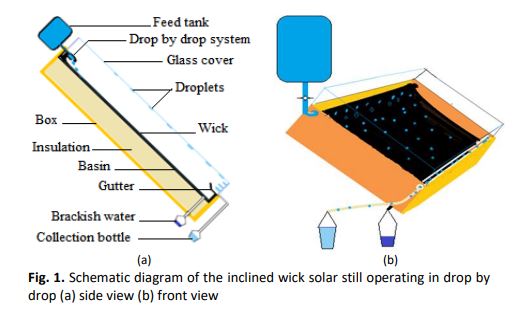Experimental Study of an Inclined Wick Solar Still Operating in Drop by Drop System Under The Climatic Conditions of Hodna's Region, Algeria
DOI:
https://doi.org/10.37934/arfmts.94.1.188199Keywords:
Solar energy, desalination, inclined solar still, wick, performance, paybackAbstract
Solar distillation is a very economical process for the fresh water production, especially in arid and semi-arid areas where solar energy is abundant. Several types of solar stills have been designed and manufactured for a purpose to increase their performances. This work aims to study experimentally under outdoor conditions of Hodna’s region, two types of solar still, the first is an inclined solar still with different wick thicknesses (thick, medium and thin) operating in drop by drop system of feed water and the other is conventional. Four clear days of the April months have been chosen to experiment the solar stills performances. The results showed that the solar stills performances are notably influenced by design and operating conditions, as revealed by the daily production and efficiency values of the inclined solar still with thin wick which achieved 4.14 liter/m2.day and 46.66%, with an improvement of about 23.21% and 12.56 % respectively, compared to those of the conventional solar still, which reached 3.36 l/m2 and 34.1% respectively. In addition, the economic analysis illustrates that the low cost of one liter of distilled water and the quicker payback period at the same time are for the inclined solar still with a thin wick of about 0.011$/l and 77 days respectively.
Downloads
































